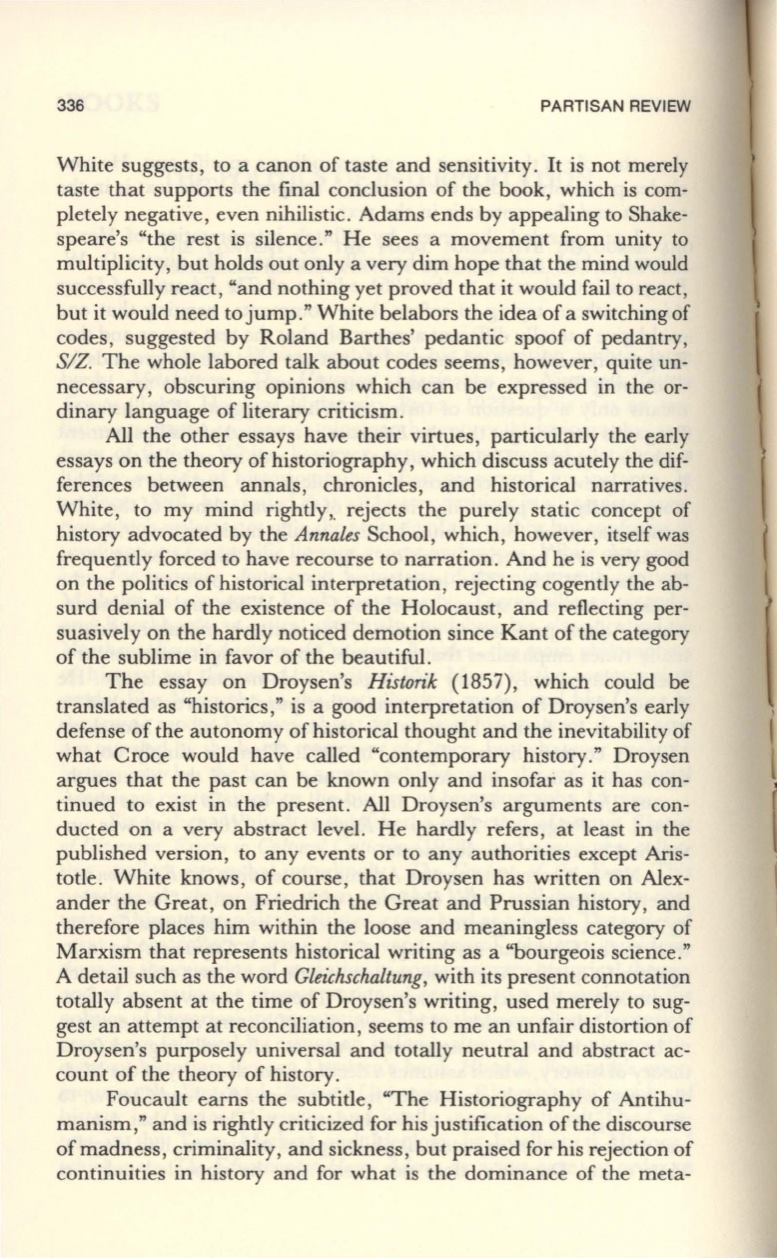
336
PARTISAN REVIEW
White suggests, to a canon of taste and sensitivity. It is not merely
taste that supports the final conclusion of the book, which is com–
pletely negative, even nihilistic. Adams ends by appealing to Shake–
speare's "the rest is silence." He sees a movement from unity to
multiplicity, but holds out only a very dim hope that the mind would
successfully react, "and nothing yet proved that it would fail to react,
but it would need to jump." White belabors the idea of a switching of
codes, suggested by Roland Barthes' pedantic spoof of pedantry,
SIZ.
The whole labored talk about codes seems, however, quite un–
necessary, obscuring opinions which can be expressed in the or–
dinary language of literary criticism.
All the other essays have their virtues, particularly the early
essays on the theory of historiography, which discuss acutely the dif–
ferences between annals, chronicles, and historical narratives.
White, to my mind rightly" rejects the purely static concept of
history advocated by the
Annales
School, which, however, itself was
frequently forced to have recourse to narration. And he is very good
on the politics of historical interpretation, rejecting cogently the ab–
surd denial of the existence of the Holocaust, and reflecting per–
suasively on the hardly noticed demotion since Kant of the category
of the sublime in favor of the beautiful.
The essay on Droysen's
Historik
(1857), which could be
translated as "historics," is a good interpretation of Droysen's early
defense of the autonomy of historical thought and the inevitability of
what Croce would have called "contemporary history." Droysen
argues that the past can be known only and insofar as it has con–
tinued to exist in the present, All Droysen's arguments are con–
ducted on a very abstract level. He hardly refers, at least in the
published version, to any events or to any authorities except Aris–
totle. White knows, of course, that Droysen has written on Alex–
ander the Great, on Friedrich the Great and Prussian history, and
therefore places him within the loose and meaningless category of
Marxism that represents historical writing as a "bourgeois science,"
A detail such as the word
Gleichschaltung,
with its present connotation
totally absent at the time of Droysen's writing, used merely to sug–
gest an attempt at reconciliation, seems to me an unfair distortion of
Droysen's purposely universal and totally neutral and abstract ac–
count of the theory of history.
Foucault earns the subtitle, "The Historiography of Antihu–
manism," and is rightly criticized for his justification of the discourse
of madness, criminality, and sickness, but praised for his rejection of
continuities in history and for what is the dominance of the meta-


